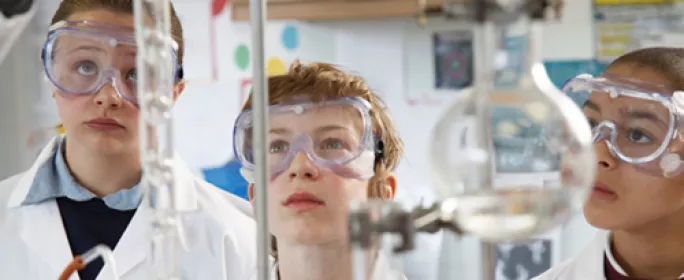
Ofqual: science practicals will no longer count towards GCSE grades
Assessment of pupils’ practical science work could be completely removed from new GCSEs, under controversial plans unveiled by Ofqual today.
The exams watchdog says its reforms will reinvigorate the hands-on aspect of the subjects by stopping teaching to the test for “just a few experiments”.
Controlled assessment of practical work - which currently makes up a quarter of pupils’ final science GCSE grades - would be scrapped.
But, under Ofqual’s proposals, at least 15 per cent of marks from written exam questions in each science GCSE would “draw on students’ practical science experience”.
The watchdog is likely to encounter stiff resistance, however. Similar plans to stop practical science work counting towards overall A-level grades triggered a wave of opposition from leading scientists, universities and teachers when they were announced earlier this year.
The regulator insists that the status quo for practical science in both sets of qualifications is untenable. Ofqual’s GCSE plans state that “there is a universal view” that current practical assessments “are not working”.
In an exclusive TES interview, Ofqual chief regulator Glenys Stacey said that practicals were “stultifying” for pupils and led to them practising only the narrow range of skills that were likely to be assessed, removing real experimentation from science.
“Things haven’t been working well enough for some time,” she said. “Students are becoming overly familiar with a limited number of predictable experiments [that are] really preparing for the end assessment, whereas the real purpose of practical assessment is to stimulate learning.”
Ofqual published analysis today which shows that students typically get higher scores for GCSE controlled assessment of practical work, marked by their teachers, than they do in written exams.
It notes that: “Controlled assessment marks also tend to be skewed towards the maximum mark.”
The watchdog’s consultation paper quotes the Wellcome Trust, saying that the current science GCSE system “is vulnerable to widespread malpractice”. Ofqual has also said that it is “concerned about the increasing number of allegations of malpractice” regarding similar arrangements for science A-levels.
But Ms Stacey told TES that it was the repetitive coaching of pupils in practical work - rather than malpractice or overgenerous marking - that was the cause of skewed results in science controlled assessments.
“We are not suggesting here that schools are overmarking,” she said. “What we are saying is that the onus on the summative assessment is undermining the curriculum aims.”
Ofqual wants GCSE science specifications to set out the apparatus that pupils should use, the practical techniques that they should develop and a minimum of eight practical activities that they will be expected to complete during their course.
“Students will not be able to do well [in the GCSEs] unless they have done it [the practical work],” Ms Stacey said. “If I was a science teacher at the moment I would probably be punching the air but also thumping the table saying, ‘Right, my students aren’t going to get good results unless they do enough of this, so I want the curriculum time to be able to deliver it well.’
“It is an opportunity for science teachers to do what they are in science for.”
Ofqual also wants schools and pupils to be required to keep a record of their practical work, to be made available to exam boards on request.
Asked what would stop schools from being able to falsify such records, Ms Stacey said: “Students would know about it and parents would know about it so I would expect responsible citizens to be raising it through our whistle-blowing policy.”
Ofqual considers its proposed “live” exam board checks on school practical science work for A-level to be too consuming at GCSE because of the greater numbers involved.
The consultation runs until February 4.
Related stories:
Register with Tes and you can read five free articles every month, plus you'll have access to our range of award-winning newsletters.
Keep reading for just £4.90 per month
You've reached your limit of free articles this month. Subscribe for £4.90 per month for three months and get:
- Unlimited access to all Tes magazine content
- Exclusive subscriber-only stories
- Award-winning email newsletters
You've reached your limit of free articles this month. Subscribe for £4.90 per month for three months and get:
- Unlimited access to all Tes magazine content
- Exclusive subscriber-only stories
- Award-winning email newsletters




